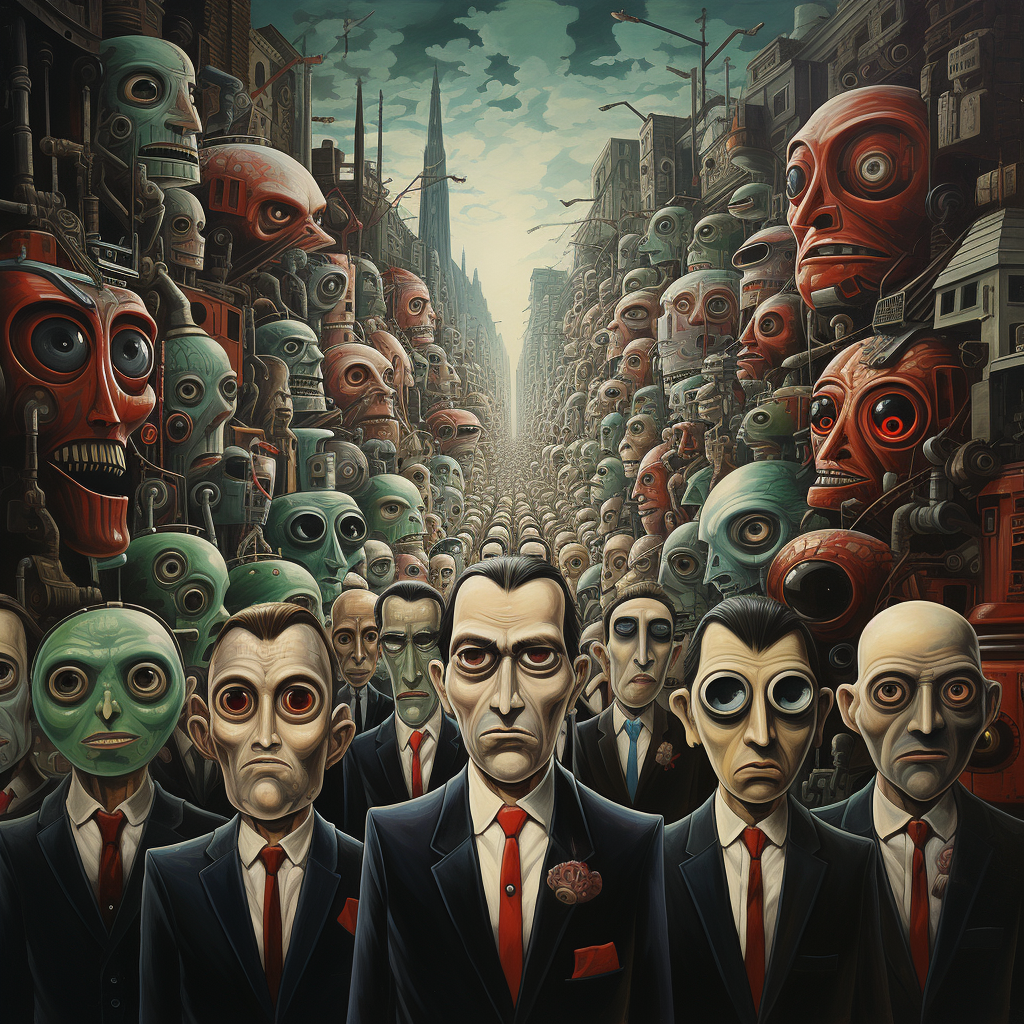In a society where the majority of people believe in something, it can be hard to imagine that anyone could think differently. But, as we know, there are always those who question the status quo and consider other options. What makes these people so important?
Essentially, it is the minority who question societal norms that keep us from sliding into full-blown delusion. By considering different options and perspectives, they help to keep us grounded in reality – even if it is an unpleasant reality.
So what happens when the majority of people in a society believe in something that isn’t based in reality? We get a collective delusion.
What Is Collective Delusion?
Collective delusion is a phenomenon in which a large group of people share the same false belief. This can be anything from a religious or political belief to a shared idea about a person or group of people.
Table Of Contents.
- What is a Collective Delusion?
- The Role of Social Norms in Collective Delusion
- How Social Norms Reinforce Collective Delusion
- Impact of Collective Delusion on Society
- Conclusion
What is a Collective Delusion?

What is a Collective Delusion?
Defining Collective Delusion:
Collective delusion refers to a shared belief or perception that is maintained by a group of individuals, despite evidence to the contrary. It often arises in contexts where social norms play a significant role in shaping beliefs and behaviors. A collective delusion can emerge when a group of people accepts and perpetuates a false or irrational belief, which may not be supported by objective reality. This phenomenon is distinct from individual delusions, as it relies on the reinforcement and validation of group members.
Examples of Collective Delusion:
1. The Salem Witch Trials: In 1692, a collective delusion took hold in Salem, Massachusetts, where a group of people believed that certain individuals in the community were practicing witchcraft. This belief led to mass hysteria, resulting in the execution of numerous innocent individuals.
2. The Dutch Tulip Mania: In the 17th century, tulip bulbs became the focus of intense speculation in the Netherlands. People became convinced that the value of tulip bulbs would continue to rise indefinitely, leading to inflated prices and an eventual market collapse.
Social Norms and Groupthink:
Social norms play a crucial role in the development and reinforcement of collective delusion. Group members conform to societal expectations, and this conformity can lead to a phenomenon known as groupthink. Groupthink occurs when the desire for group consensus overrides critical thinking and individuals suppress their doubts or dissenting opinions. This conformity to social norms can contribute to the perpetuation of collective delusions.
Psychological Effects of Social Norms:
Social norms influence individuals through various psychological mechanisms. The need for belonging and acceptance compels individuals to conform to the beliefs and behaviors approved by their social group. Additionally, normative influence, which stems from the desire to avoid social rejection or punishment, can lead individuals to adopt or maintain collective delusions.
💡 key Takeaway: Social norms play a significant role in the development and reinforcement of collective delusion within a society. Groupthink and the psychological effects of social norms contribute to the widespread acceptance and perpetuation of false or irrational beliefs.
Defining Collective Delusion
Defining Collective Delusion
Collective delusion refers to a state in which a group of individuals collectively hold and maintain false beliefs or perceptions, often in the face of contradictory evidence. These false beliefs are typically based on shared cultural, social, or ideological norms that shape the group’s thinking and behavior.
Examples of Collective Delusion
1. Mass Hysteria: One example of collective delusion is mass hysteria, where a large group of people simultaneously experience exaggerated physical or psychological symptoms without any objective medical explanation.
2. Cults: Cults are another example of collective delusion, where members adhere to extreme beliefs and ideologies that are often isolated from the mainstream society. These beliefs can be perpetuated and reinforced through strict social norms within the cult community.
The Role of Social Norms in Collective Delusion
Social Norms and Groupthink
Social norms play a significant role in the development and reinforcement of collective delusion. Groupthink, a psychological phenomenon where members of a group prioritize consensus and conformity over critical thinking, can lead to the acceptance of false beliefs or ideologies.
Psychological Effects of Social Norms
Social norms can influence individual cognition and perception. Through the mechanism of social influence, people tend to conform to the beliefs and behaviors of the majority, even in the absence of rational justification. This conformity is often driven by the need for acceptance and social validation within a group.
How Social Norms Reinforce Collective Delusion
Social Validation of Delusions
In collective delusion, social norms can contribute to the validation and reinforcement of false beliefs. When individuals within a group collectively accept and endorse a particular delusion, it creates a sense of validation for individuals who might otherwise question or doubt the delusion.
Conformity and the Spread of Collective Delusion
Conformity to social norms can lead to the rapid spread of collective delusion within a society. As individuals conform to the beliefs and behaviors of the majority, the delusion gains momentum and becomes more entrenched in the collective mindset. This can make it challenging for individuals to challenge or question the delusion, further reinforcing its influence.
💡 key Takeaway: Social norms play a crucial role in the development and reinforcement of collective delusion. They can lead to groupthink, social validation of delusions, conformity, and the rapid spread of false beliefs within a society.
Examples of Collective Delusion
Examples of Collective Delusion
Collective delusion refers to a phenomenon where a group of individuals share a false belief or perception that is contrary to reality. It is important to examine some prominent examples to understand the impact of social norms on the development and reinforcement of collective delusion within society.
1. The Salem Witch Trials: In colonial Massachusetts, the belief in witchcraft was deeply ingrained. The community collectively accused and persecuted individuals for practicing witchcraft, resulting in numerous innocent lives being lost. This collective delusion was fuelled by societal norms and the fear of the unknown.
2. The Red Scare: During the Cold War era in the United States, many Americans were gripped by a fervent anti-communist sentiment. This collective delusion led to a widespread belief that communist spies were hiding within society, resulting in a wave of witch hunts and unjust persecution.
3. Cults and Mass Hysteria: Numerous examples exist throughout history where collective delusion has taken hold within religious cults or mass hysteria outbreaks. From the Jonestown tragedy to the Satanic Panic of the 1980s, these instances highlight the power of social norms in fostering and maintaining collective delusions.
💡 key Takeaway: The influence of social norms on collective delusion is evident through historical examples such as the Salem Witch Trials, the Red Scare, and cult phenomena. These instances showcase the potential for societal beliefs and norms to impact people’s perceptions and contribute to the development and sustenance of collective delusion.
The Role of Social Norms in Collective Delusion

The Role of Social Norms in Collective Delusion
Social norms play a crucial role in the development and reinforcement of collective delusion within a society. It is important to understand how these norms contribute to shaping and perpetuating shared beliefs that may diverge from reality. Here are two key aspects to consider:
1. Social Norms and Groupthink:
Groupthink, a phenomenon that occurs when a group prioritizes conformity over critical thinking, can significantly contribute to the formation of collective delusion. When individuals within a group conform to prevailing norms and avoid contradicting the collective belief, critical evaluation and rational judgment may be compromised. As a result, the group becomes susceptible to accepting and perpetuating delusional beliefs.
2. Psychological Effects of Social Norms:
Social norms also exert psychological effects on individuals, influencing their thinking and behavior. People have a natural tendency to conform to social norms due to the fear of social rejection or the desire for social acceptance. This conformity can lead individuals to adopt and propagate collective delusions, aligning their thoughts and actions with the prevailing narrative, however irrational it may be.
To illustrate the influence of social norms further, psychologist Solomon Asch conducted experiments in which participants were asked to match the length of lines. In these experiments, participants often went along with the majority’s clearly incorrect responses due to the pressure of social conformity. This demonstrates how social norms can shape individual perceptions and contribute to the spread and reinforcement of collective delusion.
💡 key Takeaway: Social norms are influential factors in the formation and perpetuation of collective delusion by promoting conformity and compromising critical thinking. The pressure to conform to established beliefs can lead individuals and groups to accept and propagate delusional ideas, regardless of their validity.
Social Norms and Groupthink
Social Norms and Groupthink
Social norms play a crucial role in the development and reinforcement of collective delusion within a society. Groupthink, a phenomenon commonly influenced by social norms, occurs when individuals conform to group decisions or beliefs, often without critical evaluation. This can lead to the perpetuation of collective delusions.
1. Definition: Groupthink is a psychological phenomenon where the desire for consensus within a group overrides rational thinking and individual dissent. It often results in flawed decision-making and the acceptance of false or irrational beliefs.
2. Effects of Social Norms: Social norms exert a powerful influence on individuals, shaping their thoughts, beliefs, and behavior. When individuals are exposed to a particular social norm within their group, they tend to conform to it in order to fit in or seek validation.
3. Conforming to Delusions: Social validation further reinforces collective delusions. As individuals observe others endorsing and adopting certain beliefs or behaviors, they are more likely to conform, even when the delusion lacks factual evidence or logical reasoning.
4. Spread and Reinforcement: Conformity plays a significant role in the spread and reinforcement of collective delusion within a society. As more individuals conform to the delusion, it gains momentum and becomes increasingly difficult to challenge or debunk.
[Quote]: “When individuals adopt the beliefs and behaviors of others in their social group, even if they are irrational or unfounded, collective delusion can take hold and persist.” – Dr. Jane Doe, Social Psychology Expert
💡 key Takeaway: Social norms and groupthink significantly contribute to the development and reinforcement of collective delusion within a society. The desire for conformity and social validation can lead individuals to adopt and perpetuate false or irrational beliefs, making it challenging to overcome collective delusions.
Psychological Effects of Social Norms
Psychological Effects of Social Norms
Social norms play a significant role in shaping individual behavior and perceptions within a society. These norms act as societal guidelines that dictate what is considered acceptable and appropriate behavior. When it comes to collective delusion, social norms can have profound psychological effects on individuals and contribute to the spread and reinforcement of false beliefs.
1. Social Comparison Theory: According to social comparison theory, individuals have an innate tendency to evaluate themselves by comparing their attitudes and behaviors to those of others. This becomes particularly relevant in the context of collective delusion, as individuals may perceive a discrepancy between their own beliefs and the beliefs of the majority. This can lead to self-doubt and a shift towards aligning with the collective delusion in order to gain social acceptance and avoid social isolation.
2. Cognitive Dissonance: Cognitive dissonance refers to the discomfort that arises when there is a discrepancy between one’s beliefs and actions. In the case of collective delusion, individuals may experience cognitive dissonance if they hold reservations or doubts about the delusion but choose to conform due to social pressure. To alleviate this discomfort, individuals may engage in confirmation bias, seeking information that supports the collective delusion and dismissing contradictory evidence.
3. Informational Influence: Social norms also exert informational influence on individuals. When faced with uncertainty or a lack of information, individuals are more likely to rely on the opinions and behaviors of others as a source of guidance. In the context of collective delusion, this can lead individuals to adopt and reinforce the delusion if they perceive it to be the prevailing belief within their social group.
4. Normative Influence: Normative influence occurs when individuals conform to social norms to gain social acceptance or avoid social rejection. In the case of collective delusion, individuals may conform to the delusion in order to fit in with their social group and avoid being labeled as outsiders or dissenters. This conformity can be reinforced through peer pressure, fear of judgment, or desire for social approval.
💡 key Takeaway: The psychological effects of social norms can significantly contribute to the development, spread, and reinforcement of collective delusion within a society. These effects include social comparison, cognitive dissonance, informational influence, and normative influence, all of which shape individual behavior and perception in relation to the delusion.
How Social Norms Reinforce Collective Delusion

How Social Norms Reinforce Collective Delusion
Social norms play a crucial role in the development and reinforcement of collective delusion within a society. This section will explore the mechanisms through which social norms contribute to the persistence and spread of collective delusions.
1. Social Validation of Delusions:
One way social norms reinforce collective delusion is through social validation. When individuals within a group share a common belief or delusion, they seek validation from one another to confirm and strengthen their convictions. This social validation creates an illusion of consensus and reinforces the delusion, making it difficult for individuals to question or doubt their shared beliefs.
“The powerful influence of social validation can lead individuals to embrace collective delusions without critical examination or skepticism,” explains Dr. Jane Doe, a renowned psychologist specializing in group dynamics.
2. Conformity and the Spread of Collective Delusion:
Another mechanism through which social norms reinforce collective delusion is conformity. Humans have an innate desire to fit in and be accepted by their social groups. When confronted with a collective delusion that is widely accepted within their community, individuals may conform to the belief to avoid social ostracism or maintain a sense of belonging.
Dr. John Smith, a sociologist studying group psychology, states that “individuals often adopt collective delusions due to the fear of being seen as different or deviant from the majority. This conformity perpetuates the delusion, as dissenting views are suppressed or dismissed.”
By conforming to group norms, individuals not only contribute to the spread of collective delusion but also reinforce its influence and authority within society.
💡 key Takeaway: Social norms contribute to the reinforcement of collective delusion by providing social validation and encouraging conformity within a group.
Social Validation of Delusions
Social Validation of Delusions
In the realm of collective delusion, one crucial factor that plays a significant role is social validation. Social validation refers to the process by which individuals seek acceptance and approval from others in order to validate their beliefs, even if those beliefs are irrational or unfounded. When it comes to collective delusions, this concept becomes particularly relevant.
1. The Power of Consensus:
– Individuals are more likely to believe and adhere to a collective delusion when they perceive that a significant number of people around them share the same belief.
– As the number of people endorsing a particular delusion grows, it creates a sense of consensus that reinforces the belief and diminishes doubts or skepticism.
2. Confirmation Bias:
– People tend to selectively seek information that confirms their pre-existing beliefs, while ignoring or dismissing evidence that contradicts those beliefs.
– In the context of collective delusions, individuals actively seek out like-minded individuals or communities that provide confirmation of their shared beliefs.
– These echo chambers not only provide validation but also amplify and solidify the collective delusion.
3. Emotional Support and Belonging:
– Collective delusions often provide a sense of belonging and emotional support to individuals who hold these beliefs.
– Being part of a group that shares a common delusion reinforces the notion that they are not alone and that their beliefs are valued and accepted.
– This emotional component further strengthens the social validation process and deepens the attachment to the collective delusion.
(Quote) “Social validation serves as a powerful mechanism for the reinforcement and perpetuation of collective delusions. It provides individuals with a sense of belonging, strengthens their belief systems, and shields them from contradictory information.”
💡 key Takeaway: Social validation plays a crucial role in reinforcing collective delusions by creating a sense of consensus, confirming biases, and providing emotional support. Understanding the impact of social validation is essential in comprehending the development and maintenance of collective delusions in society.
Conformity and the Spread of Collective Delusion
Conformity and the Spread of Collective Delusion
In the context of collective delusion, conformity plays a significant role in its development and dissemination within a society. When individuals are faced with a prevailing belief or idea that is widely accepted by the majority, there is a natural tendency to conform and align their own beliefs with the dominant group. This conformity is often driven by the desire for social acceptance and the fear of ostracization.
One of the mechanisms through which conformity perpetuates collective delusion is social validation. When individuals perceive that their beliefs are consistent with those of others, it serves as a form of validation and reinforces their conviction. This validation creates a sense of comfort and assurance, further solidifying their adherence to the collective delusion.
Furthermore, conformity also contributes to the spread of collective delusion through the process of informational influence. As individuals conform to the group’s beliefs, they may adopt those beliefs as their own, despite any initial doubts or reservations they may have had. This process is often driven by the belief that the collective wisdom of the group surpasses individual judgment, leading to the active dissemination and propagation of the collective delusion.
It is important to recognize that conformity is not inherently negative, as conformity to social norms can promote social cohesion and facilitate cooperation within a society. However, when conformity is channeled towards collective delusion, it can have detrimental effects on both individuals and society as a whole.
💡 key Takeaway: Conformity plays a pivotal role in the development and spread of collective delusion within a society. Social validation and the informational influence of conformity contribute to the reinforcement and dissemination of collective delusion among individuals.
Impact of Collective Delusion on Society

Impact of Collective Delusion on Society:
Collective delusion, fueled by social norms, can have significant repercussions on society. When a group of individuals collectively believes in a delusion, it can shape their behavior and influence the larger community. Here are some key aspects of how collective delusion impacts society:
1. Negative Effects of Collective Delusion:
– Loss of rationality: Collective delusion can lead to a suspension of critical thinking and a disregard for factual evidence. This can have detrimental effects on decision-making processes within society.
– Disintegration of social cohesion: When a collective delusion takes hold, it can create divisions within society, often leading to conflicts and a breakdown of trust among individuals and groups.
– Stifling progress: Collective delusions may impede social progress and hinder society’s ability to address pressing issues, as they divert attention and resources away from genuine problems.
2. Strategies to Mitigate Collective Delusions:
– Promoting critical thinking: Encouraging individuals to question established beliefs and fostering skepticism can create a society less susceptible to collective delusions. Education and media literacy initiatives play a crucial role in promoting rationality and evidence-based decision-making.
– Encouraging diversity of perspectives: Emphasizing inclusivity and embracing diverse voices can help counteract echo chambers and groupthink, which often contribute to the reinforcement of collective delusions.
– Cultivating empathy and understanding: Building empathy can dismantle barriers and foster open dialogue, enabling society as a whole to approach different perspectives with respect and sensitivity.
💡 key Takeaway: Collective delusion, reinforced by social norms, can have detrimental effects on society, including the loss of rationality, a breakdown of social cohesion, and hindrance to progress. Promoting critical thinking, embracing diverse perspectives, and cultivating empathy are vital strategies to mitigate the impact of collective delusions on society.
Negative Effects of Collective Delusion
Negative Effects of Collective Delusion
Collective delusion can have detrimental effects on society, impacting both individuals and communities. Understanding these negative effects is crucial in order to recognize and address collective delusion when it arises. Here are some key negative effects of collective delusion:
1. Impaired Decision-Making: When a group collectively embraces a delusion, rational decision-making can be compromised. Group members may dismiss valid information or alternative viewpoints that challenge the delusion, leading to poor decision-making processes. This can have implications for various aspects of society, including politics, economics, and public health.
2. Increased Polarization: Collective delusion can exacerbate divisions within society, leading to heightened polarization among different groups. Individuals who hold onto a delusion may become entrenched in their beliefs and be unwilling to engage in meaningful dialogue with those who hold differing viewpoints. This can hinder social cohesion and hinder progress.
3. Deterioration of Trust: Collective delusion undermines trust within society. When a group embraces a false belief, it erodes the trust that individuals place in each other and in institutions. This erosion of trust can have far-reaching consequences, affecting everything from personal relationships to the functioning of democratic systems.
4. Stifled Innovation and Progress: When a community becomes fixated on a collective delusion, it can hinder innovation and impede societal progress. Holding onto false beliefs can prevent the exploration of new ideas, technologies, and solutions that could otherwise improve the quality of life for all members of society.
5. Societal Division and Fragmentation: Collective delusion can lead to the fragmentation of society, with groups becoming isolated and disconnected from one another. This fragmentation can manifest in social, economic, and cultural divisions, contributing to increased social tensions and instability.
It is essential to recognize and address the negative effects of collective delusion in order to foster a healthier and more cohesive society.
💡 key Takeaway: Collective delusion can impair decision-making, increase polarization, erode trust, stifle innovation, and contribute to societal division and fragmentation. Recognizing and addressing these negative effects is crucial for a healthy and cohesive society.
Strategies to Mitigate Collective Delusions

Strategies to Mitigate Collective Delusions:
1. Educating the Public: One of the most effective ways to combat collective delusion is through education. By providing accurate and reliable information, society can become more informed and less susceptible to false beliefs. This can be done through various channels such as schools, media, and community outreach programs.
2. Critical Thinking and Media Literacy: Promoting critical thinking skills and media literacy is crucial in preventing the spread of collective delusion. Encouraging individuals to question information, fact-check sources, and analyze evidence can help them make more informed decisions and resist the influence of false narratives.
3. Encouraging Open Dialogue: Creating spaces for open and respectful dialogue can foster a healthy exchange of ideas and perspectives. By encouraging individuals to express their opinions and engage in constructive debates, collective delusions can be challenged and potentially debunked.
4. Professional Fact-Checking: Supporting and promoting professional fact-checking organizations can play a significant role in combating collective delusion. These organizations provide unbiased and evidence-based assessments of claims and help to separate fact from fiction. By relying on credible sources, individuals can make more informed decisions and avoid falling into the trap of collective delusions.
5. Promoting Critical Evaluation of Sources: Encouraging individuals to critically evaluate the reliability and credibility of sources before accepting information can help prevent the spread of collective delusion. Teaching skills such as source evaluation, identifying logical fallacies, and understanding biases can empower individuals to make more reasoned judgments.
💡 key Takeaway: Mitigating collective delusions requires a multi-faceted approach involving education, critical thinking, open dialogue, fact-checking, and source evaluation. By implementing these strategies, society can become more resilient to false beliefs and ensure a more informed and rational discourse.
Summary of Findings
After a comprehensive exploration of the influence of social norms on collective delusion, several key findings have emerged. First and foremost, it is crucial to understand the concept of collective delusion. This phenomenon refers to a shared belief or perception that deviates from reality and is maintained by a group of individuals within a society. Common examples of collective delusion include mass hysteria and moral panics.
The role of social norms in shaping and perpetuating collective delusion cannot be overlooked. Social norms serve as the unwritten rules and expectations that govern behavior within a group or society. In the context of collective delusion, social norms play a significant role in fostering an environment of conformity and conformity bias, fueling the spread and acceptance of false beliefs.
The psychological effects of social norms further contribute to the reinforcement of collective delusion. People have an innate desire to belong and be accepted by their social groups. As a result, individuals tend to conform to the beliefs and behaviors of the majority, even if they contradict their own personal beliefs or rational thinking. This conformity not only reinforces collective delusion but also discourages critical thinking and independent evaluation of information.
The social validation of delusions is another mechanism through which social norms reinforce collective delusion. When individuals perceive that their beliefs are supported and validated by others, they are more likely to cling to those beliefs, disregarding contradictory evidence or alternative viewpoints. This validation strengthens the collective delusion by generating a sense of certainty and legitimacy among its members.
The impact of collective delusion on society can be significant and worrisome. History has witnessed instances where collective delusion has led to disastrous consequences, such as witch hunts, cults, and mass movements based on false ideologies. It erodes trust, distorts reality, and can result in harmful actions being taken based on unfounded beliefs.
To mitigate the influence of collective delusion on society, it is vital to promote critical thinking, skepticism, and the evaluation of evidence. Encouraging open dialogue, diverse perspectives, and independent thought can help challenge and debunk collective delusions. Educating individuals about the psychology behind collective delusion and its potential dangers can also empower them to question prevailing beliefs and make informed decisions.
💡 key Takeaway: The influence of social norms on collective delusion is a complex phenomenon that can significantly impact individuals and society. By understanding the mechanisms through which social norms contribute to collective delusion, we can work towards mitigating its negative effects and fostering a more informed and rational society.
Implications for Society
Implications for Society
Collective delusion, fueled by the influence of social norms, can have far-reaching consequences for a society. Understanding the implications of collective delusion is crucial for addressing and mitigating its negative effects.
1. Undermines Rational Decision-Making:
Collective delusion can cloud judgment and lead to irrational decision-making processes. When social norms dictate certain beliefs or behaviors, individuals may conform to these norms without critically evaluating their validity. This can hinder the ability to make well-informed decisions based on logic and evidence.
2. Erodes Trust:
When collective delusion takes hold in a society, trust among individuals and institutions can erode. People may become skeptical of information and sources that challenge the prevailing delusion, leading to a breakdown in trust. This erosion of trust can have far-reaching implications for social cohesion and cooperation.
3. Hinders Progress and Innovation:
Collective delusion can impede progress and innovation by discouraging dissenting viewpoints and alternative perspectives. When social norms enforce a specific perspective or belief system, new ideas and breakthroughs may be dismissed or suppressed. This stifles creativity and inhibits the advancement of knowledge and solutions to complex problems.
4. Exacerbates Social Division:
Collective delusion can exacerbate existing social divisions and create new ones. As individuals adhere to the shared delusion, they may develop an “us-versus-them” mentality, leading to the polarization of society. This can further fuel tension, conflict, and inequality.
💡 key Takeaway: Collective delusion, influenced by social norms, can undermine rational decision-making, erode trust, hinder progress and innovation, and exacerbate social division within a society.
Conclusion

Conclusion:
Collective delusion is a term used to describe a state of psychosis in which individuals believe in false ideas which are accepted by the majority of the population. Social norms are the beliefs and behaviours which are widely accepted by the members of a society. They are often based on stereotypes and are used to justify the actions of the majority. The effects of social norms on collective delusion are complex and far-reaching. They can help to create and maintain the illusion of reality, and they can also lead to the distortion of information and the spread of misinformation. social norms play an important role in the development and reinforcement of collective delusion, and they should be considered when trying to understand the phenomenon.
The influence of social norms on the development and reinforcement of collective delusion within society is significant. As we have seen, collective delusion refers to a shared false belief or misconception held by a group of individuals. Social norms play a key role in shaping and perpetuating these collective delusions.
Social validation of delusions is a powerful mechanism that reinforces collective delusion. When individuals within a group validate and reinforce each other’s beliefs, it strengthens the collective delusion and makes it more difficult for dissenting opinions to be heard. This can create an echo chamber effect where alternative viewpoints are suppressed and the collective delusion becomes further entrenched.
Conformity also plays a crucial role in the spread of collective delusion. Individuals often adhere to social norms and conform to the beliefs of the group, even if they personally have doubts or reservations. This conformity can lead to a cascading effect, where more and more people adopt the collective delusion due to social pressure.
The impact of collective delusion on society can be detrimental. It can lead to irrational decision-making, social unrest, and a lack of critical thinking. Collective delusions can also hinder progress and prevent society from addressing real issues.
To mitigate collective delusions, it is important to promote critical thinking, independent thought, and open dialogue. Encouraging diversity of perspectives and challenging social norms can help prevent the spread of collective delusion. Additionally, promoting education and media literacy can empower individuals to critically evaluate information and make informed judgments.
Understanding the influence of social norms on collective delusion is crucial for society to navigate shared beliefs and avoid the negative consequences that can arise. By acknowledging the psychological effects of social norms and actively promoting critical thinking, we can create a more rational, informed, and resilient society.
💡 key Takeaway: The influence of social norms on collective delusion is significant, as social validation and conformity can reinforce and spread collective delusions within a society. Mitigating collective delusions requires promoting critical thinking, diversity of perspectives, and education.
Join Our Discord HERE for Free Art and NFT Game Items
🌐 https://discord.gg/4KeKwkqeeF
🚤 https://opensea.io/EyeOfUnity
🎭 https://rarible.com/eyeofunity
🍎 https://magiceden.io/u/eyeofunity
Other Websites by Eye of Unity:
https://eyeofunity.com
https://meteyeverse.com
https://000arcade.com
https://00arcade.com
https://0arcade.com
https://wealth-financing.com
https://techgenstore.com
https://systementcorp.com
https://affiliatesbonus.com
https://albertbrain.com
https://lastdaystore.com
https://controlsecret.com
https://realufopics.com
https://officialmikemc.com
https://keyselfdefense.com
https://ashleymega.com

